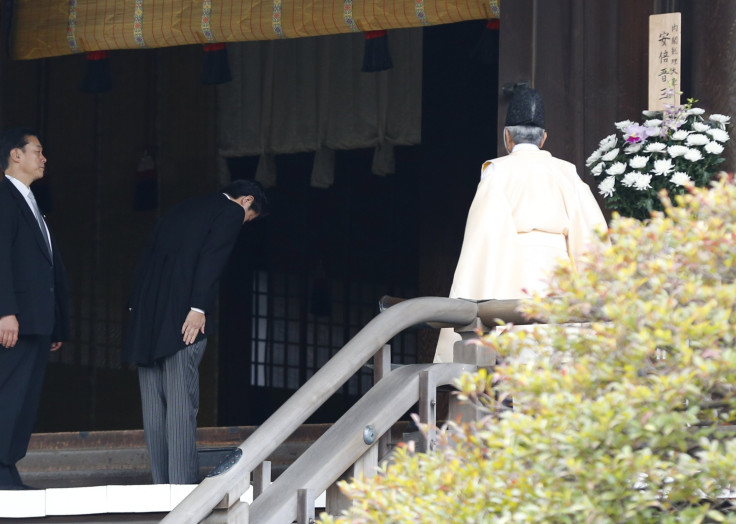Japan's Prime Minister Shinzo Abe Pays Surprise Visit To Controversial War Shrine; China Rebukes Visit As "Unacceptable," South Korea Calls It "Anachronistic Act"

Japanese Prime Minister Shinzo Abe on Thursday visited a controversial shrine to those killed in World War II, which is seen as a symbol of Japan’s war-time aggression by many, in a move that could further inflame already strained relations with its Asian neighbors, South Korea and China.
Abe’s surprise visit to the Yasukuni war shrine in central Tokyo comes exactly a year after he took office, and is widely seen as an attempt to appease his conservative vote base. Abe is the first prime minister in seven years to visit the shrine, which honors convicted Class-A war criminals along with the war dead. In the past, both China and South Korea, which have bitter memories of Japan’s military aggression, have condemned visits made to the site by Japanese politicians.
“I offered my respects to those who lost their precious lives for our country, and prayed that their souls may rest in peace,” Abe told reporters after the visit, Reuters reported.
Abe, reacting to the concerns of his neighbors, said that he had no intention to hurt the sentiments of the Chinese and South Korean people, and that his visit was to report to the dead the progress made by the nation in the past year.
"I chose this day to report (to the souls of the dead) what we have done in the year since the administration launched and to pledge and determine that never again will people suffer in war," he said as he visited the shrine, BBC reported.
Abe, who had said he deeply regretted not visiting the shrine during his previous one-year tenure as prime minister, had stayed away from the shrine so far this year, stating that he did not want to create diplomatic problems.
Many Asian countries that suffered war atrocities at the hands of the Japanese military during the war consider Yasukuni, which enshrines some 2.5 million Japanese men, women and children, along with 14 war criminals convicted for crimes during World War II, as a symbol of Japan’s colonization.
Abe entered the shrine on Thursday morning wearing a formal grey suit and spent about 15 minutes at the Shinto shrine, and offered prayers in the inner sanctum. His visit was televised live.
The visit comes at a time when bilateral relations with China and South Korea have suffered over a series of territorial disputes and claims on war-time aggressions.
China was quick to rebuke Abe’s visit to the shrine as his attempt to glorify the nation’s military past, and the visit as "absolutely unacceptable to the Chinese people."
“Under these conditions, not only does the Japanese leader not show restraint, but instead makes things worse by manufacturing another incident over history and creating a new political obstacle to the improvement and development of relations between the two countries,” Qin Gang, a foreign ministry spokesman said in a statement, Xinhua reported. “Japan must bear all the consequences arising from this.”
South Korea's Minister of Culture, Sport, and Tourism, Yoo Jin-Ryong, called Abe' visit an "anachronistic act," and added "we cannot withhold regret and anger over the visit," Reuters reported.
The U.S. embassy in Tokyo issued a statement saying it was "disappointed that Japan's leadership has taken an action that will exacerbate tensions with Japan's neighbors." However, the statement also noted Abe's "expression of remorse for the past and his reaffirmation of Japan's commitment to peace."
© Copyright IBTimes 2024. All rights reserved.





















